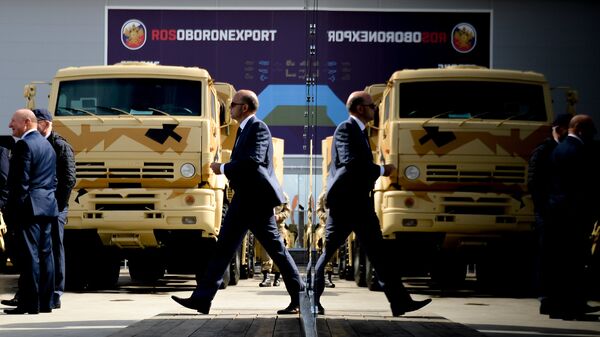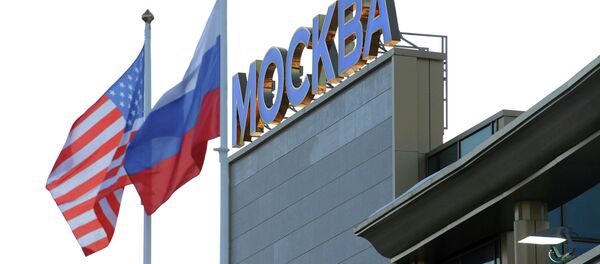The spokesperson added that these sanctions "are separate from the broader economic sanctions that have been in place since 2014" in connection with the Crimea's reunification with Russia and the conflict in eastern Ukraine.
The companies affected by the new sanctions are the 150th Aircraft Repair Plant, Aviaexport, Bazalt, Kolomna Design Bureau of Machine-Building (KBM), Rosoboronexport (ROE), Ulyanovsk Higher Aviation Academy of Civil Aviation (UVAUGA), Ural Training Center for Civil Aviation (UUTsCA), and the Zhukovskiy and Gagarin Academy (Z&G Academy).
Moscow disappointed over new US sanctions against Russian companies — Foreign Ministry — https://t.co/cfsJlcphff pic.twitter.com/tVYCy31FvJ
— RussiaEnglishNews (@RussiaENGNews) 26 марта 2017 г.
The current sanctions are due to remain in force for the coming two years. They ban US government departments and agencies from developing any trade cooperation with the blacklisted companies, which cannot obtain licenses for buying goods listed in the export control.
In an interview with RT, Russian political scientist Viktor Olevich noted that the introduction of the new sanctions clearly indicates that the normalization of Russian-American relations will not take place in the near future.
"Any attempts by Trump to reach a consensus with Russia draw anger from the US establishment and representatives from both parties. The Trump administration is, in fact, paralyzed and is dealing with the same things that its predecessors did. For us, this is an indicator of the inability to conduct a constructive dialogue and an understanding that the relations between the two countries will not begin to normalize [in the nearest future]," Olevich said.
He described Washington's desire to reduce Russia's influence on the global arms market as the real reason behind imposing sanctions against Russian companies.
"Of course, the more active Russia becomes in the world market, the lower the incomes of the US military and industrial complex plummet. The accusations of cooperation with countries that the US considers to be its opponents are only a formal reason for including Russian companies in the sanctions list. This wording has been used by the US for many years," Olevich added.
Touching upon the reasons why Russian companies were included in the new sanctions list, experts pointed to Moscow's cooperation with Iran and trade ties with the Gulf countries.
New sanctions on Russia: ‘Robotic move by US bureaucrats’ or ‘part of anti-Russia propaganda’? https://t.co/iWKOwoQG3I
— A. Smith (@360CNN) 27 марта 2017 г.
"The US wants to limit Russia's supplies to Iran and damage the two countries' cooperation on Syria. I don't think that it will work because Iran is used to trade under sanctions and make decisions independently. During the occupation, Iran retained sovereignty, unlike other Middle Eastern countries." Russian expert on the US Sergey Sudakov told RT.
He said that the new anti-Russian sanctions could be "a signal to a number of rich countries that are willing to spend a lot of money on weapons, for example, Qatar, Bahrain and Saudi Arabia."
"However, even if the number of contracts for the supply of Russian weapons to these countries is reduced, it will be an insignificant figure," Sudakov said.
Former US diplomat Jim Jatras, for his part, slammed the new US sanctions against Russia as "just another bureaucratic solution."
"Someone somewhere in a small office decided that these [Russian] companies had done something that violates US law," he said in an interview with RT.
He was echoed by US political analyst Paul Roberts, who told RT that "the [new] sanctions are just another message to Americans and Europeans that Russia is allegedly doing something wrong again."
Speaking to the Russian online newspaper Vzglyad, Leonid Ivashov, head of the Moscow-based Academy of Geopolitical Problems, a think tank, pointed out that the eight Russian companies will not be directly damaged by the US sanctions because "they, as a rule, do not cooperate with Americans."
"There will be no direct damage and we will continue to cooperate with China and Iran despite the US sanctions," Ivashov said, at the same time admitting the sanctions' indirect damage.
According to him, this damage is related to the companies from other countries which will more cautiously collaborate with their Russian partners from the companies blacklisted by the US.
"Of course, this new round of sanctions causes no serious troubles for us, but the United States did not even state the reason behind it, simply referring to their legislation which bans them from cooperation with Iran and Syria," Zakharova added.
Never miss a story again — sign up to our Telegram channel and we'll keep you up to speed!






